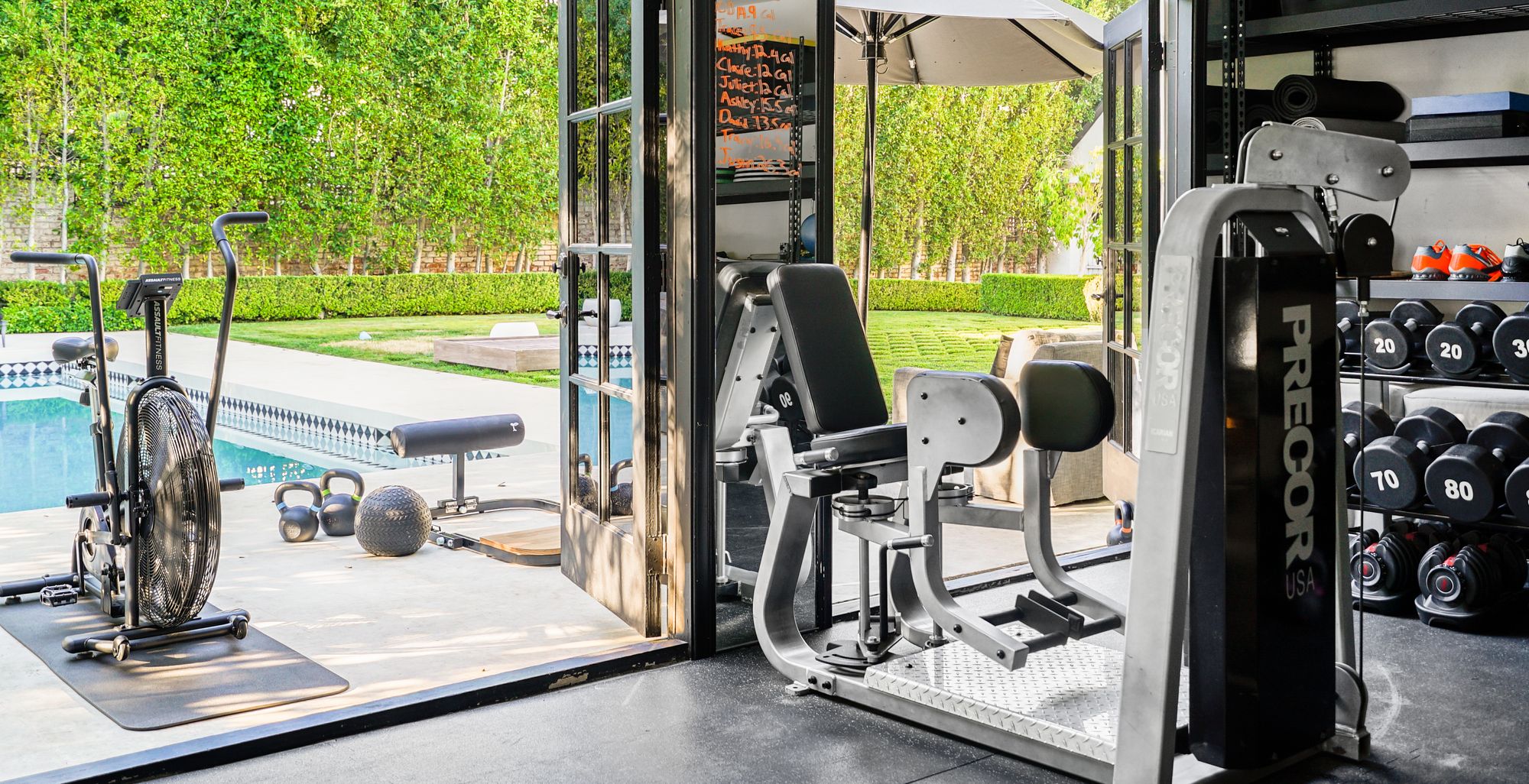Home Gyms Hit Their Stride During Covid
Some homeowners are vowing to ‘never go back’ to the gym after building their own fitness spaces.
Before the pandemic, Tracy Tutor was a regular at the Dogpound, a boutique gym in Los Angeles popular with celebrities. It’s where she met her boyfriend, personal trainer Erik Anderson. But when Covid-19 forced gyms to shut down, the couple found themselves without a place to exercise.
“When there was nothing to do but eat and drink and workout and sleep, we got this wild hair: Why don’t we turn the garage into a home gym?” says Ms. Tutor, a real-estate agent with Douglas Elliman and star of Bravo’s “Million Dollar Listing Los Angeles.”
Within a month, they converted the detached garage of their Beverly Hills home into a mirror-wrapped fitness centre, spending close to US$100,000 transforming the 21-foot by 22-foot space. The biggest challenge was sourcing the equipment, including free weights, a squat rack, a bench press, an exercise bike and a pilates reformer. “One day, Erik drove three hours to get a set of dumbbells,” Ms. Tutor says.
Once fully equipped, the gym gave Mr. Anderson a place to safely meet with clients and provided Ms. Tutor with a convenient space to workout. “I don’t think I’ll ever go back to a gym again,” she says.
Ms. Tutor is not alone.
Interest in Garage Gym Reviews, a website and social community that helps people create home gyms, has exploded since the pandemic’s onset. Site owner Cooper Mitchell says that its “diehard” Facebook group grew from 15,000 members to more than 100,000, while website traffic and YouTube subscribers increased fivefold.
“Gyms are reopening, but we’re not seeing a drop off,” Mr. Mitchell says.
The National Association of Home Builders found that 47 percent of homebuyers in 2020 considered a home gym essential or desirable.
“People are reevaluating their homes to be more inclusive to take care of themselves,” Ms. Tutor says.
Jason Friedman, a realtor with Daniel Gale Sotheby’s International Realty on Long Island, says that home gyms have become a deciding factor for a lot of buyers. “We did have multiple instances where one home having a gym was the final push the buyer needed to transact on that property as opposed to other options without one,” he says.
Designers and architects are seeing similar demand. In the last 18 months, each of Chicago-based dSPACE’s 10 residential projects has included a dedicated fitness area. They range from 100-square-foot workout areas with smart equipment like Pelotons or Tonals to full-blown professional gyms with basketball courts. The spaces cost anywhere from $15,000 to well over $100,000, depending on the size and amenities included.
“A home gym becomes a lifestyle,” says Kevin Toukoumidis, dSPACE’s principal architect. “It offers more freedom.”
Acoustics and lighting are the top priorities for any exercise room, Mr. Toukoumidis adds, so the space is comfortable and noise is not disruptive to the rest of the home. Natural daylight is best when possible, but mirrors and a warmer temperature light can evoke a daytime feel.
Vancouver-based interior designer Stephanie Brown likes to add texture, like grasscloth or linen wallcovering, and warm materials like hardwood floors or panelled walls. She also suggests adding artwork and a statement piece of furniture, like a console table below a television. “Stack fitness magazines on top and stock bottled water to make it feel more like you’re at a hotel spa gym rather than a basement,” she says.
When it comes to gym equipment, Mr. Mitchell advises to buy “less and better,” and expect to spend around $1500 to $5,000. Choose pieces that you’ll actually use, even if it means spending more money. A Peloton, for example, will cost at least around $2200 before the membership. “But it’s worth it because it’s going to motivate you to actually use it,” he says. “Whereas a regular stationary bike may just end up being a coat hanger overtime.”
For one of Ms. Brown’s Maui-based clients, that meant indulging in a full line of products from Pent, a high-end exercise equipment company based in Poland. The pieces are made from carved walnut and brass, and a single 8-pound kettlebell costs US$396, while a full set of 20 dumbbells with a stand goes for US$18,680. “They look like jewelry,” Ms. Brown says. “Even if you’re not feeling the draw to workout, it makes it a more pleasant experience.”
Roxanna Kennedy, a member of Garage Gym Reviews from Florence, Ky., “refused to workout at home” prior to the pandemic, opting for in-person kickboxing classes instead. But after the birth of her second son last year, she didn’t have that option when she was looking for a way to lose weight. A personal trainer helped her choose the right weightlifting equipment, plus a heavy bag for boxing, and she turned a sunny corner of her basement into a gym. She’s down 43 pounds.
She has kept her membership to a commercial gym, but rarely uses it. With two children under the age of four, “childcare is a major barrier” for her. “I wake every morning at 5:45 and get a full workout completed, before I even wake up the kids and go to work,” Mrs. Kennedy says. “I wouldn’t have that option if I didn’t have a home gym.”
Reprinted by permission of Mansion Global. Copyright 2021 Dow Jones & Company. Inc. All Rights Reserved Worldwide. Original date of publication: August 30, 2021
 Copyright 2020, Dow Jones & Company, Inc. All Rights Reserved Worldwide. LEARN MORE
Copyright 2020, Dow Jones & Company, Inc. All Rights Reserved Worldwide. LEARN MORE
This stylish family home combines a classic palette and finishes with a flexible floorplan
Just 55 minutes from Sydney, make this your creative getaway located in the majestic Hawkesbury region.
As Paris makes its final preparations for the Olympic games, its residents are busy with their own—packing their suitcases, confirming their reservations, and getting out of town.
Worried about the hordes of crowds and overall chaos the Olympics could bring, Parisians are fleeing the city in droves and inundating resort cities around the country. Hotels and holiday rentals in some of France’s most popular vacation destinations—from the French Riviera in the south to the beaches of Normandy in the north—say they are expecting massive crowds this year in advance of the Olympics. The games will run from July 26-Aug. 1.
“It’s already a major holiday season for us, and beyond that, we have the Olympics,” says Stéphane Personeni, general manager of the Lily of the Valley hotel in Saint Tropez. “People began booking early this year.”
Personeni’s hotel typically has no issues filling its rooms each summer—by May of each year, the luxury hotel typically finds itself completely booked out for the months of July and August. But this year, the 53-room hotel began filling up for summer reservations in February.
“We told our regular guests that everything—hotels, apartments, villas—are going to be hard to find this summer,” Personeni says. His neighbours around Saint Tropez say they’re similarly booked up.
As of March, the online marketplace Gens de Confiance (“Trusted People”), saw a 50% increase in reservations from Parisians seeking vacation rentals outside the capital during the Olympics.
Already, August is a popular vacation time for the French. With a minimum of five weeks of vacation mandated by law, many decide to take the entire month off, renting out villas in beachside destinations for longer periods.
But beyond the typical August travel, the Olympics are having a real impact, says Bertille Marchal, a spokesperson for Gens de Confiance.
“We’ve seen nearly three times more reservations for the dates of the Olympics than the following two weeks,” Marchal says. “The increase is definitely linked to the Olympic Games.”

Getty Images
According to the site, the most sought-out vacation destinations are Morbihan and Loire-Atlantique, a seaside region in the northwest; le Var, a coastal area within the southeast of France along the Côte d’Azur; and the island of Corsica in the Mediterranean.
Meanwhile, the Olympics haven’t necessarily been a boon to foreign tourism in the country. Many tourists who might have otherwise come to France are avoiding it this year in favour of other European capitals. In Paris, demand for stays at high-end hotels has collapsed, with bookings down 50% in July compared to last year, according to UMIH Prestige, which represents hotels charging at least €800 ($865) a night for rooms.
Earlier this year, high-end restaurants and concierges said the Olympics might even be an opportunity to score a hard-get-seat at the city’s fine dining.
In the Occitanie region in southwest France, the overall number of reservations this summer hasn’t changed much from last year, says Vincent Gare, president of the regional tourism committee there.
“But looking further at the numbers, we do see an increase in the clientele coming from the Paris region,” Gare told Le Figaro, noting that the increase in reservations has fallen directly on the dates of the Olympic games.
Michel Barré, a retiree living in Paris’s Le Marais neighbourhood, is one of those opting for the beach rather than the opening ceremony. In January, he booked a stay in Normandy for two weeks.
“Even though it’s a major European capital, Paris is still a small city—it’s a massive effort to host all of these events,” Barré says. “The Olympics are going to be a mess.”
More than anything, he just wants some calm after an event-filled summer in Paris, which just before the Olympics experienced the drama of a snap election called by Macron.
“It’s been a hectic summer here,” he says.

AFP via Getty Images
Parisians—Barré included—feel that the city, by over-catering to its tourists, is driving out many residents.
Parts of the Seine—usually one of the most popular summertime hangout spots —have been closed off for weeks as the city installs bleachers and Olympics signage. In certain neighbourhoods, residents will need to scan a QR code with police to access their own apartments. And from the Olympics to Sept. 8, Paris is nearly doubling the price of transit tickets from €2.15 to €4 per ride.
The city’s clear willingness to capitalise on its tourists has motivated some residents to do the same. In March, the number of active Airbnb listings in Paris reached an all-time high as hosts rushed to list their apartments. Listings grew 40% from the same time last year, according to the company.
With their regular clients taking off, Parisian restaurants and merchants are complaining that business is down.
“Are there any Parisians left in Paris?” Alaine Fontaine, president of the restaurant industry association, told the radio station Franceinfo on Sunday. “For the last three weeks, there haven’t been any here.”
Still, for all the talk of those leaving, there are plenty who have decided to stick around.
Jay Swanson, an American expat and YouTuber, can’t imagine leaving during the Olympics—he secured his tickets to see ping pong and volleyball last year. He’s also less concerned about the crowds and road closures than others, having just put together a series of videos explaining how to navigate Paris during the games.
“It’s been 100 years since the Games came to Paris; when else will we get a chance to host the world like this?” Swanson says. “So many Parisians are leaving and tourism is down, so not only will it be quiet but the only people left will be here for a party.”
This stylish family home combines a classic palette and finishes with a flexible floorplan
Just 55 minutes from Sydney, make this your creative getaway located in the majestic Hawkesbury region.






















